The Music Room Blu-ray Movie
HomeThe Music Room Blu-ray Movie 
জলসাঘর / JalsagharCriterion | 1958 | 99 min | Not rated | Jul 19, 2011
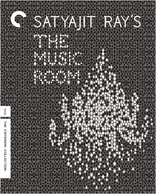
Movie rating
7.9 | / 10 |
Blu-ray rating
| Users | 4.5 | |
| Reviewer | 4.5 | |
| Overall | 4.5 |
Overview
The Music Room (1958)
Indian landowner Biswambhar Roy lives in luxury, but his fortune is slowly slipping away. Despite his decreasing funds, Roy insists on maintaining his lavish lifestyle, particularly his ornate music room, which he utilizes as a performance space for an array of accomplished singers, dancers, and musicians. Even as Roy continues his financial freefall, he futilely struggles to compete with the concerts put on by his younger neighbor.
Starring: Chhabi Biswas, Padmadevi, Pinaki Sengupta, Sardar Akhtar, Gangapada BasuDirector: Satyajit Ray
| Foreign | Uncertain |
| Drama | Uncertain |
| Music | Uncertain |
Specifications
Video
Video codec: MPEG-4 AVC
Video resolution: 1080p
Aspect ratio: 1.34:1
Original aspect ratio: 1.37:1
Audio
Bengali: LPCM Mono
Subtitles
English
Discs
50GB Blu-ray Disc
Single disc (1 BD)
Playback
Region A (locked)
Review
Rating summary
| Movie | 4.5 | |
| Video | 4.5 | |
| Audio | 4.0 | |
| Extras | 4.0 | |
| Overall | 4.5 |
The Music Room Blu-ray Movie Review
Reviewed by Dr. Svet Atanasov August 2, 2011Satyajit Ray's "Jalsaghar" a.k.a "The Music Room" (1958) arrives on Blu-ray courtesy of Criterion. The supplemental features on the disc include an interview with critic and writer Andrew Robinson; video interview with acclaimed director Mira Nair; excerpt from the French television program L'invite de FR3; and a documentary film directed by Shyam Benegal. In Hindi, with optional English subtitles for the main feature. Region-A "locked".

In the Music Room
Though its setting is very different, Satyajit Rayís The Music Room has plenty in common with Luchino Viscontiís legendary The Leopard. The two films tell the stories of two proud and powerful men who begin to realize that their worlds are changing, slowly but irreversibly.
In Viscontiís film, the great Burt Lancaster plays Prince Don Fabrizio Salina, who witnesses the birth of a new country. He is the last of its kind, a man of vision and integrity, who understands what is underway and does not attempt to confront it. Throughout the film, Prince Don Fabrizio Salina is also routinely imitated by Don Calogero Sedara, a simpleton who has suddenly become rich and started moving up the social ladder.
In Rayís film, Huzur (the famous Indian actor Chhabi Biswas), an aging aristocrat, witnesses how everything that he has loved and cherished through the years begins to fade away. He spends most of his time in his palace, where he often holds large parties in his favorite jalsaghar (music room). Famous musicians and dancers regularly visit the place.
These parties, however, are not cheap. Because the nearby river has flooded a lot of his land, and thus dramatically reduced his income, Huzur has started selling jewelry and other valuable possessions to pay for them. His wife (Padma Devi) urges him to reconsider his lifestyle, but he ignores her. For him, hosting the lavish parties is an important tradition that must be preserved. Pride and reputation are also at stake. A low-caste neighbor, who has recently become rich, has started hosting similar parties and many of Huzurís regular guests have begun praising him.
A tragedy forces Huzur to close the music room and he becomes seriously depressed. Meanwhile, his neighborís reputation continues to grow as musicians and dancers from all over the country visit his home.
Like Viscontiís The Leopard, Rayís The Music Room is a nostalgic film about the end of an era. The dilemmas Huzur faces are very similar to the ones Prince Don Fabrizio Salina is presented with. Both men are of noble blood and staunch traditionalists who eventually come to realize that their time has passed.
What separates the two aristocrats is their attitude towards music. For Huzur, music is part of his identity and it literally makes him feel alive -- he is recognized and appreciated by his neighbors only when they attend his parties; the rest of the time Huzur is a lonely ghost wandering around his lavish palace. Prince Don Fabrizio Salina is also fond of music, but he can live without it. Unlike Huzur, he is also constantly surrounded by family members who respect his words and keep his spirits up.
What makes Rayís film so fascinating to behold is the fact that it looks exotic but its themes are undeniably universal. It was inspired by a short story written by Tarashankar Banerjee and it is deeply rooted in Bengali culture, but everything in it reflects a world-view towards life and people.
The Music Room was lensed by Subrata Mitra, arguably Indiaís greatest cinematographer, who also collaborated with Ray on his celebrated The Apu Trilogy.
Note: In 1959, The Music Room was screened at the Moscow International Film Festival where it won Silver Prize for Best Composer (Ustad Vilayat Khan).
The Music Room Blu-ray Movie, Video Quality 
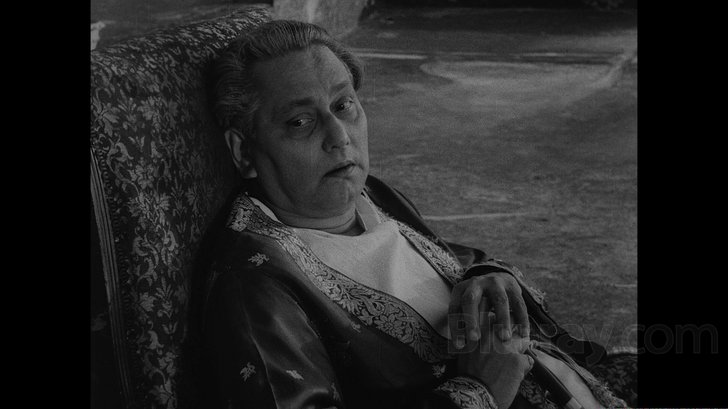
Presented in an aspect ratio of 1.34:1, encoded with MPEG-4 AVC and granted a 1080p transfer, Satyajit Ray's The Music Room arrives on Blu-ray courtesy of Criterion.
The following text appears inside the booklet provided with this Blu-ray disc:
"This new high-definition digital transfer was created on a Spirit 4K Datacine from an original 35mm fine-grain master positive. Thousands of instances of dirt, debris, scratches, splices, warps, jitter, and flicker were manually removed using MTI's DRS system and Pixel Farm's PFClean system, while Digital Vision's Phoenix system was used for small dirt, grain, noise reduction, and scratches.
Telecine supervisor: Maria Palazzola.
Color correction: Gregg Garvin/Modern Videofilm, Los Angeles."
Considering the fact that the original camera negative of The Music Room was destroyed (though a second-generation fine-grain master positive was made directly from it), the quality of the high-definition transfer Criterion has used for this Blu-ray release is indeed very impressive. Detail is consistently strong, clarity very good throughout the entire film, and contrast levels well balanced. Color reproduction is also very convincing -- the blacks are rich but not boosted, while the grays and whites are stable and looking fresh. Edge-enhancement is not an issue of concern. There are only a few scenes in the film where extremely mild traces of sharpening are visible. There are no traces of heavy denoising either. Naturally, grain is prominent, though not always evenly distributed and well resolved. There are various small frame transition issues -- skips, jumps, etc., -- but none of them are overly distracting. Small scratches and cuts are also visible, but it is obvious that they could not be removed completely without affecting the integrity of the image. All in all, this is a strong, very convincing presentation that does the film justice. (Note: This is a Region-A "locked" Blu-ray disc. Therefore, you must have a native Region-A or Region-Free PS3 or SA in order to access its content).
The Music Room Blu-ray Movie, Audio Quality 
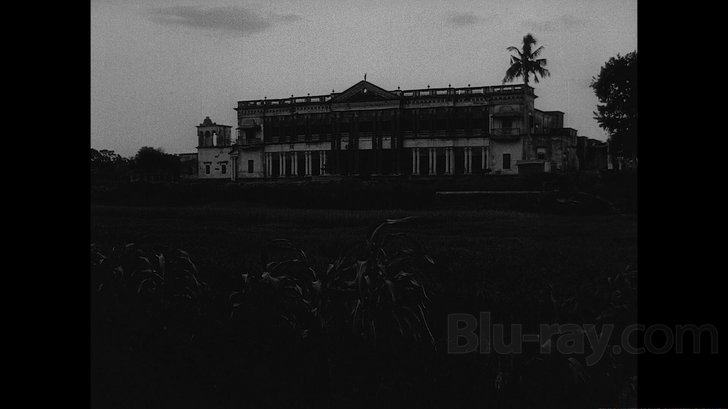
There is only one audio track on this Blu-ray disc: Bengali LPCM 1.0. For the record, Criterion have provided optional English subtitles for the main feature.
The following text appears inside the booklet provided with this Blu-ray disc:
"The monaural soundtrack was remastered at 24-bit from the original 35mm soundtrack print. Clicks, thumps, hiss, and hum were manually removed using Pro Tools HD. Crackle was attenuated using AudioCube's integrated workstation."
I noticed some very small dynamic fluctuations, mostly during the performances in the music room, but I assume that they are inherited from the soundtrack print. On the other hand, the dialog is crisp, clean, stable, and easy to follow. There are no distortions, pops, or annoying hiss either. The English subtitles are excellent and easy to read.
The Music Room Blu-ray Movie, Special Features and Extras 
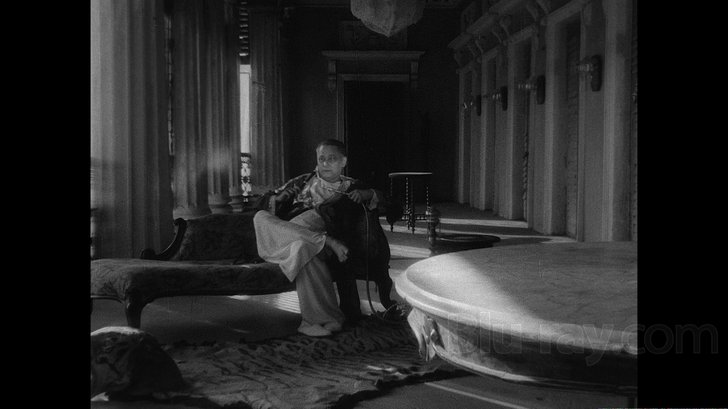
- For the Love of Music - an excellent interview with Andrew Robinson, author of Satyajit Ray: The Inner Eye, recorded for Criterion in 2011. Mr. Robinson discusses director Ray's legacy and style, The Music Room, the importance of music in director Ray's film, etc. In English, not subtitled. (18 min, 1080p).
- Mira Nair - acclaimed director Mira Nair (Monsoon Wedding, Salaam Bombay) discusses The Music Room and the legacy of the great Bengali director. This video interview was recorded for Criterion in 2011. (16 min, 1080p).
- French Roundtable - an excerpt from the French television program L'invite de FR3 featuring director Ray, film critic Michel Clement. filmmaker Claude Sautet, and host Dominique Reznikoff. The episode was broadcast on January 18, 1981. In French, with optional English subtitles. (11 min, 1080p).
- Satyajit Ray - a documentary film, directed by Shyam Benegal, featuring raw footage from the shooting of director Ray's thirty-second film, The Home and the World, as well as various interviews. In Hindi and English, with optional English subtitles where necessary. (132 min, 1080i).
- Booklet - a 36-page illustrated booklet featuring Philip Kemp's essay "Distant Music"; Satyajit Ray's "Winding Route to a Music Room", an essay, written in 1963, from the collection Our Films, Their Films, originally published in India in 1976; and "On the Music of The Music Room: An Interview With Satyajit Ray", an interview conducted by Andrew Robinson in Kolkata in 1986.
The Music Room Blu-ray Movie, Overall Score and Recommendation 
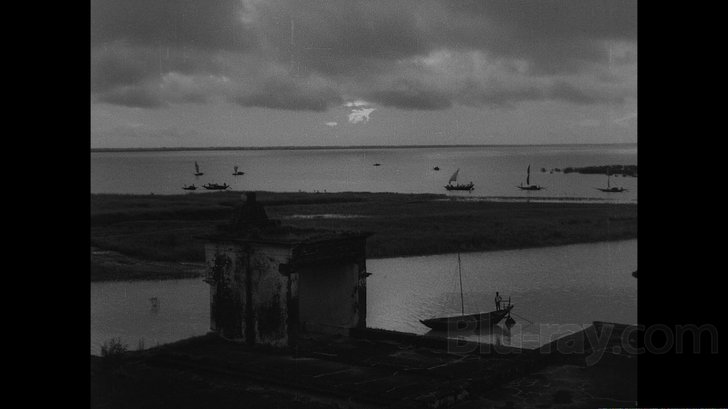
Satyajit Ray's The Music Room is a fascinating film about a powerful man in love with music and the end of an era. As expected, Criterion's presentation of the film is of exceptionally high quality and is complimented with a set of very good supplemental features. VERY HIGHLY RECOMMENDED.
Similar titles
Similar titles you might also like

The Big City
মহানগর / Mahanagar
1963

Charulata
চারুলতা / The Lonely Wife
1964

Vivre sa vie
Vivre sa vie: Film en douze tableaux / My Life to Live
1962

Apur Sansar 4K
অপুর সংসার / The World of Apu
1959

Pather Panchali 4K
পথের পাঁচালী / Song of the Little Road
1955

The Coward
কাপুরুষ / Kapurush / included with "The Big City" release
1965

Aparajito 4K
অপরাজিত / The Unvanquished
1956

Red Desert
Il deserto rosso
1964

Late Spring
晩春 | 4K Restoration
1949

Yi Yi
2000

Black Narcissus
1947

The Seventh Seal 4K
Det sjunde inseglet
1957

Aquarius
2016

L' Atalante
1934

Zťro de conduite
Zero for Conduct
1933

The Magician
Ansiktet
1958

A Ship to India
Skepp till Indialand / A Ship Bound for India
1947

The Traveler
مسافر | Remastered
1974

Letter Never Sent
Неотправленное письмо / Neotpravlennoe pismo
1959

The Life of Oharu
西鶴一代女 / Saikaku ichidai onna
1952